Finnish axes: features and selection rules
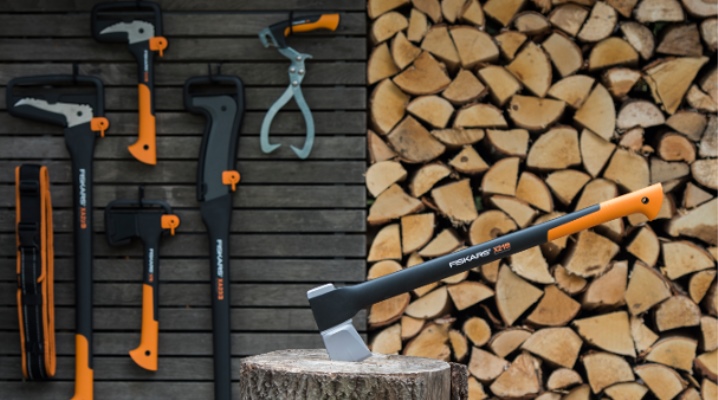
The Finnish ax is a popular hand tool for carpentry work. Among all other varieties, it stands out for its ergonomics and ease of use. Today, this term most often refers to the invention of Heikki Karn, a retired air traffic controller who proposed and patented the effect of a lever in a wood splitter.
The resulting model of the tool made it possible to make the work with the cleaver much safer and more efficient, to exclude the sticking of the cutting edge of the metal in the tree.
A bit of history
For the first time the concept of "Finnish ax" appeared at the end of the 19th century and was applied to products manufactured in Finland by Swedish blacksmiths. In terms of its structure, the instrument hardly differed from the analogous one from Sweden.
There were three main types - cleavers for firewood, poles for carpentry, universal models. The production of the metal part was carried out mainly by hand forging, later - using casting.
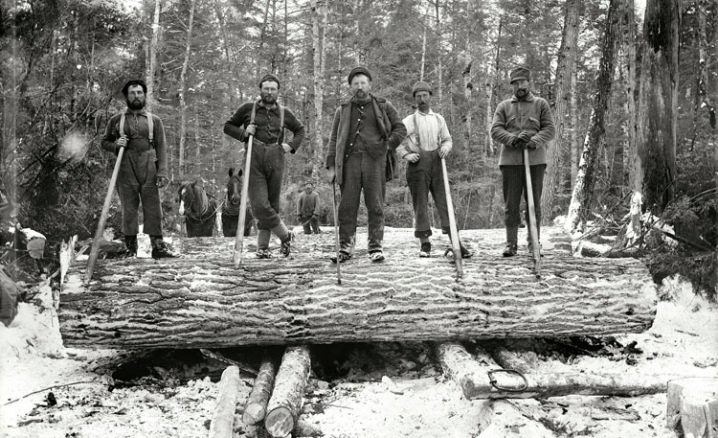
The handle of the Finnish ax has its own characteristic features. It has a conical thrust type, a mushroom-shaped part on the back of the handle and a slightly curved "abdomen" on the working side. Modern models are most often equipped with a hook at the end for a more comfortable fit in the palm of your hand.
The characteristic pattern of the eyelet, tapering upwards, allows the wedge to be returned to its place with one blow when the ax is loosened.
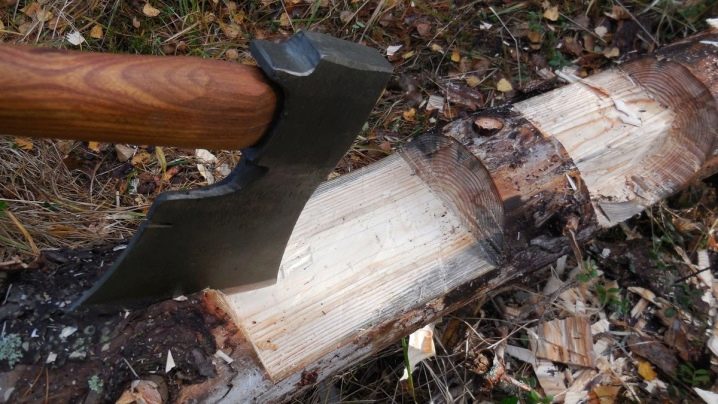
Specifications
Used by professional woodcutters and popular with private homeowners, the Finnish ax differs from classic counterparts in its shifted center of gravity, which allows less energy to be spent in the wood splitting process.
A tool that uses the lever principle in its work is not suitable for traditional carpentry work. But it makes it easy to cope with chopping wood, even for people who are not too knowledgeable in such matters, is easy to maintain, and looks very attractive against the background of its counterparts supplied to the domestic market from Asian countries.
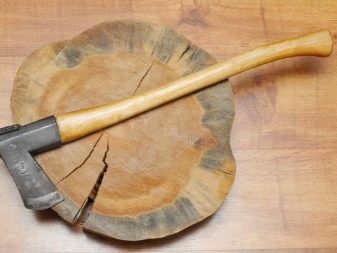
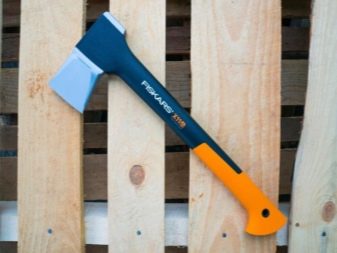
Modern manufacturers from Finland offer an original look at the production of cleavers.
Their products have:
- carbon steel base;
- Teflon stainless steel coating of the metal part;
- fiberglass reinforced polyamide composite handle;
- crimping of the butt in a polymer base, excluding accidental separation from the handle.
All these innovations only added attractiveness to the Finnish axes and again made the whole world talk about them.
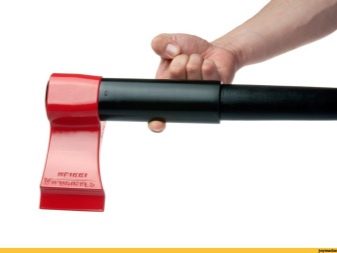
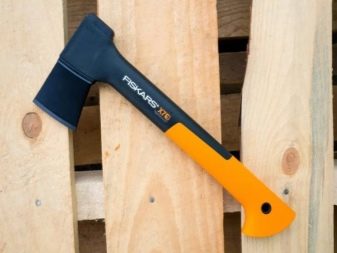
Advantages and disadvantages
The study of the models presented on the market helps to understand what the features of the Finnish ax are most pronounced. For example, the modern invention of Heikki Karna called Vipukirves Leveraxe allows you to abandon the traditional deck and chop blocks in the tire, significantly increasing the frequency of strikes - up to 100 per minute.
It is not recommended to perform such manipulations with an ordinary cleaver due to the design features.
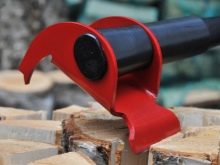
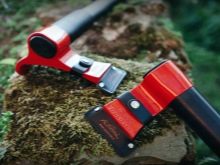
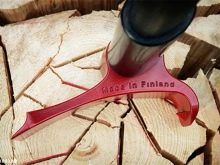
Classic Finnish axes, such as those of the Fiskars brand, have handles with balanced geometric characteristics, they are lighter, are not subject to butt loosening, are strong and durable, and have a wide size range allowing you to choose a model with the desired size characteristics.
The main disadvantage of Finnish axes is their rather high price.
In addition, products with handles made of polymer materials have the ability to resonate the force of the impact, and the recoil is felt more than in the case of wooden counterparts.
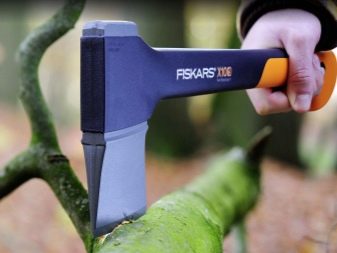
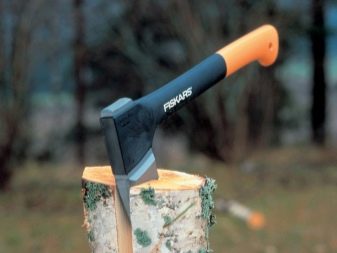
How to choose?
There are a number of basic rules to follow when choosing Finnish axes.
- Minimum weight... The lighter the tool is, the less hand will get tired in the process of chopping wood. The optimal weight is considered to be 2-2.5 kg, for professional models this figure will be higher. Too light options are also not suitable, since they significantly reduce the force exerted on the deck.
- Blade type... "Eared" are considered optimal for working with dry wood. Raw wood is pricked with wedge-shaped axes, which do not get stuck and provide more efficient delamination of the material.
- Handle length... It affects the impact force indicator. The longer the handle, the stronger the impact. In addition, the choice of material also matters. Fiberglass and other polymers are not afraid of corrosion, humid environment, wood can swell or dry out under the influence of moisture.
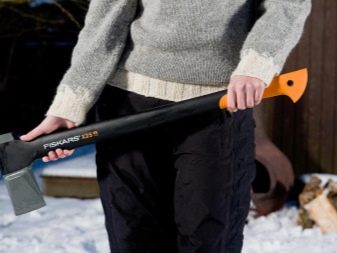
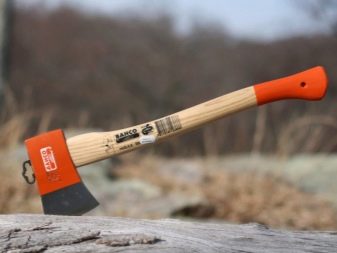
All these indicators are relevant for the classic cleavers, which have changed little since their first appearance in the arsenal of Finnish lumberjacks. For new models that operate on the principle of a lever, other important points will need to be considered.
A modern firewood cleaver with a displaced center of gravity needs to be purchased only from the copyright holder - a company that has a license to manufacture it.
The Leveraxe brand manufactures products in a variety of size ranges. Axes are intended for chopping firewood and are focused specifically on this type of work. The butt with displacement on contact with the split deck produces a rotational movement, eliminates accidental misses.
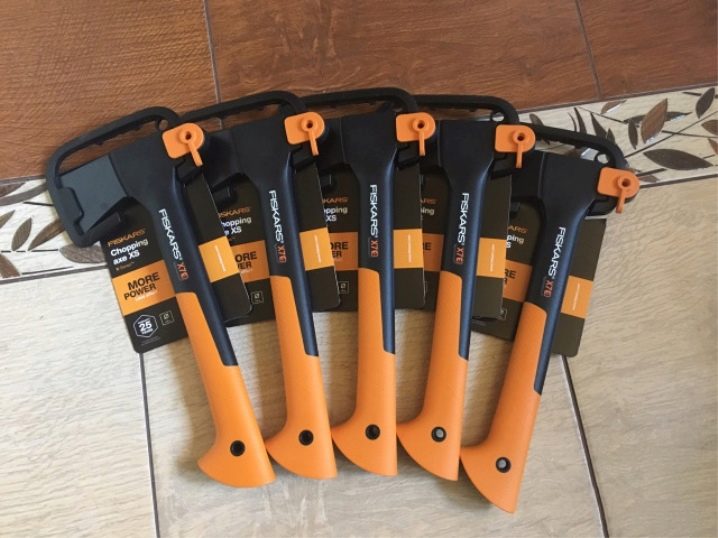
When choosing a Finnish cleaver, it is worth paying attention to a number of points.
- Design... The lever is formed by changing the fixation of the butt. It attaches to the side of the handle, rather than the center one, which provides a shift in the center of gravity, while requiring less effort on impact.
- Shock absorber... It is also a safety "claw" - it acts as a stopper when the blade comes into contact with wood, prevents the blade from slipping, makes the felling safe.
- Handle... Real Finnish cleavers use natural wood, which provides minimal recoil when in contact with the material.
The correct cleaver is able to easily and quickly split the deck into firewood, even in the hands of an inept user.
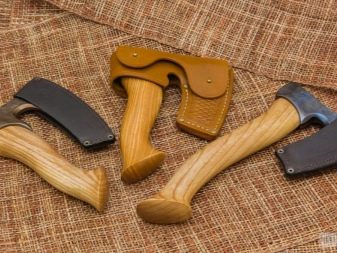
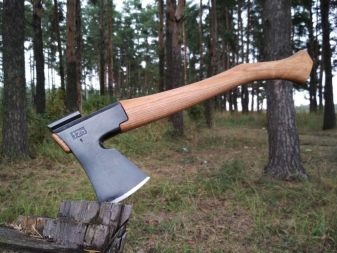
Lumberjack Secrets
When chopping wood using an ax with an offset center of gravity, be sure to hold the handle with both hands to ensure the correct application of force. Begin cutting the deck from the left edge. When performing a swing, the arm located higher on the handle is shifted down. When striking, the grip is weakened - so the lever will perform its task more efficiently, making it possible to quickly cope with the division of a large solid wood.
Cleavers should not be used for use as a tool for carpentry, cutting logs. For safety reasons, always hold the tool with both hands so that the force is evenly distributed. At the first impact, you should retreat from the edge by 6-8 cm. To eliminate all possible risks, it is necessary to chop firewood at a distance of at least 10 m from residential buildings, places where people and animals are located.
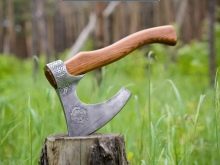

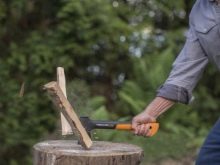
The blade is sharpened using a grinding wheel or stone... In the case of axes in which the center of gravity is shifted, it is rarely required. Since even a blunt cleaver, where the principle of a lever is used, successfully copes with its tasks.
A correctly chosen Finnish ax will allow you to cope with the preparation of firewood for a stove or fireplace, it will be the best addition to the set of basic tools used on the farm. The high cost of such an acquisition pays off with ease, efficiency and safety of use.
In the next video, you will learn about the rules for choosing an ax.

































































The comment was sent successfully.